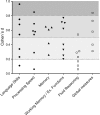Cognitive deficits including executive functioning in relation to clinical parameters in paediatric MS patients
- PMID: 29566099
- PMCID: PMC5864068
- DOI: 10.1371/journal.pone.0194873
Cognitive deficits including executive functioning in relation to clinical parameters in paediatric MS patients
Abstract
Background: A number of studies have investigated cognitive impairment in paediatric patients with multiple sclerosis (MS) but deficits regarding executive functions have not been comprehensively assessed up to now. This study was meant to explore cognitive impairment in German paediatric MS patients with a focus on deficits in executive functions and relate these to clinical disease parameters.
Methods and findings: Forty paediatric MS patients, which presented at the German centre for MS in childhood and adolescence, were assessed for cognitive deficits applying a very comprehensive battery of cognitive tests including the Wechsler Intelligence scale and subtests of the D-KEFS for executive functions. The performance of MS patients was compared with a group of age and sex matched healthy controls using between-subjects ANOVAs. Paediatric MS patients performed worse in tests assessing verbal comprehension and fluency, processing speed, memory, calculation skills and other executive functions. Arranged by the cognitive domain, group differences were most pronounced regarding verbal comprehension and fluency for the WISC subtests Comprehension (p = 0.000), Vocabulary (p = 0.003) and Information (p = 0.005); regarding processing speed for the written SDMT (p = 0.001) and the WISC subtest Coding (p = 0.005); regarding memory for the VLMT training (p = 0.007) and the BASIC MLT pattern learning training (p = 0.009); regarding executive functions including working memory for the WISC subtest Arithmetics (p = 0.002), the D-KEFS Design Fluency (p = 0.003) and the Corsi block tapping backward task (p = 0.003). Fluid reasoning was largely intact. Relations of cognitive performance and clinical parameters were assessed in MS patients. Disease duration was associated with a reduced performance in tests belonging to the domains verbal comprehension and fluency (WISC Vocabulary: p = 0.034, WISC Information: p = 0.015) and fluid reasoning (WISC Picture Completion: p = 0.003) as well as the WISC Working Memory Index (p = 0.047). Patients with a disease onset between 11 and 14 years performed better in fluid reasoning (WISC matrix reasoning: p = 0.024) than patients with a disease onset at an age above 14. The number of relapses negatively influenced the visual spatial memory performance (BASIC MLT pattern learning training: p = 0.009).
Conclusions: The distribution of cognitive deficits in a representative group German of paediatric MS patients was similar to the pattern known from other European and North-American cohorts. Paediatric MS patients do have cognitive deficits in executive functions and key qualities necessary for successful school performance. Disease duration, age of onset and the number of relapses influence cognitive performance. Cognitive screenings should be implemented on a regular basis for paediatric MS patients, enabling early intervention.
Conflict of interest statement
Figures
References
-
- Boiko A, Vorobeychik G, Paty D, Devonshire V, Sadovnick D, University of British Columbia MS Clinic Neurologists. Early onset multiple sclerosis: a longitudinal study. Neurology. 2002;59: 1006–1010. - PubMed
-
- Ghezzi A, Deplano V, Faroni J, Grasso MG, Liquori M, Marrosu G, et al. Multiple sclerosis in childhood: clinical features of 149 cases. Mult Scler. 1997;3: 43–46. doi: 10.1177/135245859700300105 - DOI - PubMed
-
- Aubert-Broche B, Fonov V, Narayanan S, Arnold DL, Araujo D, Fetco D, et al. Onset of multiple sclerosis before adulthood leads to failure of age-expected brain growth. Neurology. 2014;83: 2140–2146. doi: 10.1212/WNL.0000000000001045 - DOI - PMC - PubMed
-
- Stark W, Huppke P and Gärtner J. Paediatric multiple sclerosis: the experience of the German Centre for Multiple Sclerosis in Childhood and Adolescence. J Neurol. 2008;255 Suppl 6: 119–122. - PubMed
-
- Fay AJ, Mowry EM, Strober J, Waubant E. Relapse severity and recovery in early pediatric multiple sclerosis. Mult Scler. 2012;18: 1008–1012. doi: 10.1177/1352458511431725 - DOI - PubMed
Publication types
MeSH terms
LinkOut - more resources
Full Text Sources
Other Literature Sources
Medical


